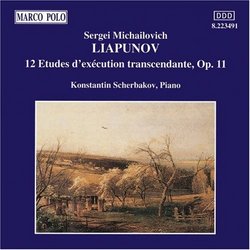| All Artists: Liapunov, Konstantin Scherbakov Title: 12 Etudes Members Wishing: 0 Total Copies: 0 Label: Marco Polo Release Date: 8/8/1994 Genre: Classical Styles: Chamber Music, Historical Periods, Classical (c.1770-1830) Number of Discs: 1 SwapaCD Credits: 1 UPCs: 730099349123, 4891030234918 |
Search - Liapunov, Konstantin Scherbakov :: 12 Etudes
 | Liapunov, Konstantin Scherbakov 12 Etudes Genre: Classical
|
Larger Image |
CD Details |
CD ReviewsTranscendental performances of richly rewarding etudes T. D. Owen | London United Kingdom | 05/23/2002 (5 out of 5 stars) "This is one of the best solo piano records ever made. From the opening bars of the Lullaby, rising slowly like incense, it casts a spell that is hard to break. Scherbakov's touch and delineation of melodic lines (often several at once) is faultless, he exercises dazzling velocity and clarity in runs and glittering passagework, and has a dynamic range from the whispered to the positively thunderous. This unjustly neglected music, fit to stand alongside the Transcendental Studies of Liszt (their inspiration), deserves a far wider audience for its colour, variety, and evocative power. Scherbakov is outstanding in the turbulent studies, conjuring up the swift, icy waters of a Caucasian torrent, the brooding menace of a Siberian storm and the mighty open spaces of Central Asia, yet equally impressive in delicate, perfumed twilight or the dances of ghosts and goblins by night. The most famous of the set, "Lesghinka", a whirl of Muslim tribesmen worthy of Balakirev, is given a typically concentrated and exciting performance, but the disc is worth the price alone for the final "Elegy in Memory of Franz Liszt". This Hungarian-Russian rhapsody, sombre, magnificent and finally triumphant, is played exultantly and with absolute command. The original benchmark for the twelve Studies was set by Louis Kentner, first with a pioneering issue made for the Maharajah of Mysore, and then re-recorded towards the end of his career. Kentner displays tremendous natural flair and affinity for style, with great epic sweep, and his classic accounts should certainly also be heard. Scherbakov, slightly more cerebral, is imaginative in his own way, and manages to combine an unfailing grasp of the structure of individual pieces and the set as a whole with a sense of freshness and spontaneity. With outstandingly realistic and resonant recording, made in a German hall, capturing every detail of the pianist's exceptional articulation, this new CD on Marco Polo must take pride of place. No piano-lover, or indeed casual listener in search of buried treasure, should hesitate here." Good performances of neglected music Michael Whincop | GRIFFITH UNIVERSITY, QLD AUSTRALIA | 05/23/2001 (4 out of 5 stars) "I purchased this disk without much knowledge of the composer, much less the music, on the faith of the quality of the pianist, Konstantin Scherbakov, who has performed some excellent Beethoven, Rachmaninov and Godowsky. I was pleasantly surprised by the music. Liapunov was born in 1859, and fell under the influence of Mily Balakirev. His music reflects the Russian nationalism of Balakirev and the other members of the Mighty Handful (Rismky, Mussorgsky, etc), but synthesised with a more Western aesthetic characteristic of Franz Liszt. As such, his music is somewhat reminiscent of both Medtner and Rachmaninov, although his ideas are not as concise as Medtner's, nor is he a melodist of the order of Rachmaninov. His Etudes, comprised in this recording, are perhaps his finest work. It is influenced by Liszt's own set of twelve etudes, and is by no means ashamed by comparison. The opening Lullaby has a touch of late Brahms; the Dance of the Ghosts and the penultimate Dance of the Elves pay debts to Liszt's Gnomenreigen, and Storm, the sixth, evokes memories of Liszt's Orage, although it is more lyrical than that octave cyclone. The third etude, Pealing of Bells, falls within a great Russian tradition, to which Mussorgsky and Rachmaninov's contributions are well known. Terek, the fourth, is the one that reminds me most of Balakirev with a quite Oriental feel to it. Summer Night, the fifth, has a touch of a Chopin Ballade in it, just as Brahms' Ballades foreshadow the Idyll, the seventh. There is an anticipation of Medtner in Lesginka; and a smoother Tchaikovsky aesthetic in Aeolian Harps. Perhaps the finest works are the Epic Song and the Elegy in Memory of Liszt, the former most impressive in the opening dialogue between a stern theme in chords and harp-like arpeggios, suggestive of a troubador of old singing to his harp's accompaniment. The Elegy is a dark, sombre work, which makes formidable virtuoso demands, quite as fine as Liszt's Les Morts or much of Les Harmonies Poetiques et Religieuses. To this music, Scherbakov brings his formidable technique and the necessary Russian melancholy and moodiness. In all an excellent disk, recommended to all those interested in Russian music and nineteenth century Russian music." Hommage to Liszt Daniel Johnson | Griffith University , Australia | 02/10/2002 (5 out of 5 stars) "With this cd I was quite overwhelmed. The Idea of another composer with 12 transcendental etudes was not new to me. I had tried to play Dance of the elves (Etude no 11) from this set at the age of 17. The piece in it's self was rather difficult. This is my first time with a Konstantin Scherbakov recordning and I thought It was absolutely masterful playing. Very nationalistic undertones especially with Etudes 3 and 8 (Which is not uncommen with Russian composers) but overall a pleasure to listen to and a great recording to use as a guide when playing these wonderful advanced gems."
|

 Track Listings (12) - Disc #1
Track Listings (12) - Disc #1